Supplements for Bipolar Disorder: What May Support Stability
Introduction
Bipolar disorder can be a complex, unpredictable journey — filled with emotional highs and lows that affect every area of life. While medication and therapy remain the foundation of treatment, many people are interested in natural supplements that can support mood stability, reduce inflammation, and promote overall brain health.
It’s important to note: supplements are not a substitute for prescribed medication or professional care, but they can be helpful adjuncts when used thoughtfully under medical supervision.
This article explores the best evidence-based supplements that may support emotional stability in bipolar disorder, why they work, and how to use them safely alongside a balanced lifestyle 🌱
Looking for supplements for Brain Fog? Click here.
🧠 Understanding Bipolar Disorder
Bipolar disorder is a mood regulation condition characterized by alternating periods of mania (or hypomania) and depression.
🌤️ The Bipolar Spectrum
There are several types:
Bipolar I: Full manic episodes lasting at least 7 days, often requiring hospitalization, alternating with depressive episodes.
Bipolar II: Hypomanic episodes (less intense than mania) alternating with depression.
Cyclothymia: Chronic, milder mood fluctuations over two or more years.
🔄 Biological Roots
Research shows that bipolar disorder involves:
Neurotransmitter imbalances (dopamine, serotonin, glutamate, GABA).
Mitochondrial dysfunction — the brain’s energy systems become unstable.
Inflammation and oxidative stress that affect mood regulation.
Circadian rhythm disruption — irregular sleep-wake cycles that trigger episodes.
💡 The goal of supplement support is to help balance brain chemistry and protect neurons — not to replace professional treatment, but to strengthen resilience.
🌿 The Role of Nutrients in Mood Regulation

Your brain runs on nutrients. Every neurotransmitter — from serotonin to dopamine — is built using vitamins, minerals, and amino acids. Deficiencies can make emotional stability harder to maintain.
Chronic inflammation, oxidative stress, and poor mitochondrial health are increasingly linked to bipolar mood cycling. Nutrients that reduce these issues may help buffer against mood instability and fatigue.
💊 Top Evidence-Based Supplements for Bipolar Support
Below are the supplements most studied or recommended by integrative psychiatrists to support mood balance in bipolar disorder.
🌊 Omega-3 Fatty Acids (EPA and DHA)
Omega-3s — particularly EPA (eicosapentaenoic acid) — have been among the most researched natural aids for bipolar disorder.
🧠 Why It Helps
Regulates serotonin and dopamine signaling.
Reduces neuroinflammation and oxidative stress.
May shorten depressive episodes and improve emotional control.
🔬 Research
A Journal of Clinical Psychiatry study found that high-EPA omega-3 supplementation reduced depressive symptoms in bipolar patients when used alongside standard medication.
💧 Dosage
1000–3000 mg/day combined EPA + DHA (aim for at least 60% EPA).
Take with meals for best absorption.
🐠 Tip: Choose molecularly distilled fish oil or vegan algae-based omega-3s for purity.
🌞 Vitamin D
Vitamin D acts as a neurosteroid hormone, influencing mood, inflammation, and circadian rhythms — all key in bipolar stability.
🧠 Why It Helps
Supports serotonin synthesis.
Regulates immune and inflammatory pathways.
Helps stabilize seasonal mood shifts common in bipolar depression.
🔬 Research
People with bipolar disorder often have significantly lower vitamin D levels. Supplementation has been shown to improve mood, especially in winter months.
💧 Dosage
1000–4000 IU daily (based on blood test levels).
Take with healthy fats for absorption.
🌤️ Optimal blood range: 40–60 ng/mL for mood support.
⚡ Magnesium
Magnesium is essential for nerve function, stress regulation, and sleep. Many individuals with mood disorders have suboptimal magnesium levels, especially during stress or medication use.
🧘 Why It Helps
Regulates NMDA receptors and GABA (calming neurotransmitter).
Reduces anxiety, agitation, and muscle tension.
Supports sleep — vital for episode prevention.
🔬 Research
Studies show magnesium may shorten the duration of manic symptoms when used as an adjunct to mood stabilizers.
💊 Dosage
200–400 mg daily (magnesium glycinate or threonate preferred).
Take in the evening to enhance calm and sleep.
💡 Avoid magnesium oxide — it’s poorly absorbed.
🧬 N-Acetylcysteine (NAC)
NAC is a powerful antioxidant that replenishes glutathione, the brain’s main defense against oxidative stress.
🧠 Why It Helps
Improves mitochondrial function.
Reduces glutamate overactivity — linked to mania and depression.
Promotes emotional resilience by reducing inflammation.
🔬 Research
A Biological Psychiatry study found NAC (2000 mg/day) significantly improved depressive symptoms in bipolar disorder.
💊 Dosage
600–1000 mg twice daily.
Take with food and plenty of water.
⚠️ NAC can interact with nitroglycerin or certain chemotherapy drugs — consult your provider.
🧡 CoQ10 (Coenzyme Q10)
CoQ10 fuels mitochondria, which are often dysfunctional in bipolar disorder. Mitochondrial instability can cause fatigue, brain fog, and poor emotional regulation.
🧠 Why It Helps
Supports brain energy production.
Reduces oxidative stress.
May improve cognitive clarity and motivation.
💊 Dosage
100–200 mg daily with meals (use ubiquinol form for better absorption).
💡 Bonus: Works synergistically with omega-3s and B vitamins.
🌿 B-Complex Vitamins
B vitamins (especially B6, B9, and B12) are essential for neurotransmitter synthesis and methylation — the process your body uses to regulate gene expression and detoxification.
🧠 Why It Helps
Balances serotonin and dopamine levels.
Supports adrenal function and reduces stress.
Deficiency in folate or B12 is linked to depressive relapse in bipolar disorder.
💊 Dosage
Take a high-quality methylated B-complex once daily.
Include methylfolate (5-MTHF) instead of folic acid for better absorption.
⚠️ Note: B-vitamin overuse can be stimulating — monitor mood carefully.
🌾 L-Theanine
L-Theanine is an amino acid found in green tea that promotes calm alertness without sedation.
🧘 Why It Helps
Increases alpha brain waves (relaxation state).
Supports GABA and dopamine balance.
Reduces anxiety and stress-related irritability.
💊 Dosage
100–200 mg as needed (morning or afternoon).
💬 Helpful for managing anxiety or agitation between mood swings.
🌼 Zinc and Selenium
Zinc and selenium are trace minerals vital for brain function and mood regulation.
🧠 Why It Helps
Zinc supports BDNF (brain growth factor) and serotonin metabolism.
Selenium supports thyroid function — imbalances can mimic mood instability.
💊 Dosage
Zinc: 15–25 mg/day
Selenium: 100–200 mcg/day
🥦 Tip: Don’t exceed doses long-term; too much can be toxic.
🌺 Taurine
Taurine is an amino acid with calming, anti-excitatory properties.
🧘 Why It Helps
Stabilizes neuronal membranes and modulates GABA.
May help reduce manic irritability or restlessness.
Supports electrolyte balance in the brain.
💊 Dosage
500–2000 mg/day (often divided into two doses).
🍄 Adaptogens (Ashwagandha, Rhodiola, Holy Basil)
Adaptogens help the body adapt to stress — and stress is a major trigger for bipolar mood fluctuations.
🧠 Benefits
Lower cortisol and inflammation.
Support adrenal balance.
Enhance resilience to environmental or emotional stressors.
💊 Dosing Examples
Ashwagandha: 300–500 mg/day
Rhodiola: 200–400 mg (morning only)
Holy Basil: 300–600 mg/day
⚠️ Caution: Rhodiola may be too stimulating during manic phases; use adaptogens with guidance.
Looking for supplements for Brain Fog? Click here.
🧘 Calming Nutrients That May Reduce Mania Triggers
While depression is often the focus of treatment, preventing mania is equally crucial. Some natural compounds help reduce neuronal overstimulation:
🌙 GABA (Gamma-Aminobutyric Acid)
Promotes calmness and reduces racing thoughts.
Dosage: 100–500 mg before bed.
🌿 Glycine
A calming amino acid that improves sleep and reduces stress reactivity.
Dosage: 2–3 grams before bedtime.
🌸 Inositol
Supports serotonin signaling; helpful in bipolar depression.
Dosage: 2–6 grams/day, divided doses.
⚠️ May worsen mania in some — start low.
⚖️ Supplements to Be Cautious With
While many natural compounds are beneficial, others can destabilize mood or interact with medication.
⚠️ Avoid or use with caution:
St. John’s Wort: Can trigger mania and interfere with mood stabilizers.
SAM-e: May elevate mood too quickly, risking manic symptoms.
Ginseng: Can be overstimulating.
High-dose caffeine or green tea extracts: May worsen sleep and mania.
Always talk to your psychiatrist before starting or adjusting supplements.
🌬️ Breathwork and Nervous System Regulation

Your autonomic nervous system plays a huge role in emotional stability. Breathwork helps train your body to shift out of “fight or flight” mode into calm regulation.
🌫️ Try This 2-Minute Reset
Inhale slowly through the nose for 4 seconds.
Hold for 1–2 seconds.
Exhale through the mouth for 6 seconds.
Repeat 10 times.
This simple rhythm activates the vagus nerve, which calms the nervous system — helpful for anxiety, irritability, or racing thoughts.
🧘 Combine breathwork with magnesium or L-theanine for synergistic calm.
Looking for supplements for Brain Fog? Click here.
💬 Therapy, Structure, and Self-Regulation
Supplements can support brain chemistry, but therapy provides emotional tools to manage triggers and daily stressors.
🧩 Effective Therapies for Bipolar Disorder
Cognitive Behavioral Therapy (CBT): Helps reframe catastrophic thoughts.
Interpersonal and Social Rhythm Therapy (IPSRT): Focuses on maintaining consistent routines to stabilize circadian rhythms.
Mindfulness-Based Therapy: Builds awareness of early signs of mood shifts.
Family-Focused Therapy: Improves support networks and communication.
💛 When paired with nutritional and lifestyle support, therapy strengthens both emotional and biological resilience.
Looking for online therapy ? Click Here.
🧘 Lifestyle Foundations for Stability
Bipolar stability relies not just on supplements but on steady rhythms.
🕒 Daily Structure
Regular sleep schedule: Go to bed and wake up at the same time daily.
Eat balanced meals: Avoid long fasting or sugar spikes.
Exercise moderately: 20–30 minutes of daily movement improves serotonin and BDNF.
Sunlight exposure: Regulates vitamin D and circadian rhythm.
Mindful routines: Gentle breathwork, gratitude journaling, or yoga.
⚖️ Stability comes from rhythm — the nervous system thrives on predictability.
🌿 Building a Balanced Supplement Plan
If you’re considering supplements, think of them as part of a three-layer support system:
Layer 1: Foundational Health
Omega-3
Vitamin D
Magnesium
B-Complex
Layer 2: Brain Resilience
NAC
CoQ10
Zinc/Selenium
Layer 3: Emotional Support
L-Theanine
Adaptogens (for stress)
GABA or Glycine (for calm)
💬 Introduce one at a time, wait 2–3 weeks, and track mood response.
🌈 The Mind-Body Connection in Bipolar Health
Bipolar disorder isn’t just a “brain chemistry” condition — it’s a whole-body imbalance influenced by inflammation, gut health, and stress hormones.
That’s why a holistic approach — supplements, nutrition, therapy, movement, and breathwork — can be so powerful.
🌞 Supplements regulate chemistry.
🌿 Diet nourishes neurons.
💨 Breath calms the system.
🧘 Therapy strengthens awareness.
Together, they create the conditions for long-term balance and emotional peace.
🧩 Key Takeaways
✅ Bipolar disorder requires professional management, but supplements can support stability when used safely.
✅ The most promising natural aids include Omega-3s, NAC, Magnesium, Vitamin D, and CoQ10.
✅ Avoid overstimulating supplements like St. John’s Wort or SAM-e without medical approval.
✅ Combine natural supports with consistent sleep, nutrition, therapy, and daily structure.
✅ Always coordinate with your psychiatrist before adding any supplement — synergy and safety matter most.
🌿 Stability isn’t about suppressing emotion — it’s about creating a foundation strong enough to handle its waves.
📚 References
Stoll, A. L., et al. (1999). “Omega 3 fatty acids in bipolar disorder.” Archives of General Psychiatry, 56(5), 407–412.
Magalhães, P. V., et al. (2011). “N-acetylcysteine for bipolar disorder: A systematic review and meta-analysis.” Journal of Clinical Psychiatry, 72(6), 794–799.
Malhi, G. S., et al. (2013). “Potential mechanisms of action of nutraceuticals in bipolar disorder.” Progress in Neuro-Psychopharmacology & Biological Psychiatry, 45, 1–11.
Geddes, J. R., & Miklowitz, D. J. (2013). “Treatment of bipolar disorder.” Lancet, 381(9878), 1672–1682.
Gao, K., et al. (2018). “Magnesium and mood disorders: A systematic review.” Nutrients, 10(5), 632.
Berk, M., et al. (2008). “N-acetyl cysteine for depressive symptoms in bipolar disorder: A double-blind randomized placebo-controlled trial.” Biological Psychiatry, 64(6), 468–475.
Rybakowski, J. (2018). “Glutamatergic dysregulation in bipolar disorder.” Pharmacological Reports, 70(5), 968–975.
Post, R. M. (2016). “The role of inflammation in bipolar disorder.” Dialogues in Clinical Neuroscience, 18(2), 124–133.
Related Posts
-

Nootropics That Promote Calm and Rest
Explore the world of calming nootropics — natural brain enhancers that promote relaxation, better focus, and deeper rest. Learn how L-Theanine, magnesium, ashwagandha, and other adaptogens help balance your nervous system, reduce stress, and support restorative sleep.
-

Best Natural Supplement Stack for Sleep
Discover the best natural supplement stack for deep, restorative sleep. Learn how nutrients like magnesium, L-theanine, glycine, and calming herbs such as chamomile and ashwagandha work together to relax your body, calm your mind, and improve sleep quality—naturally and safely.
-

Combining L-Theanine and Magnesium for Sleep: A Calm Night, Naturally
Discover how combining L-Theanine and Magnesium can help you drift into deep, restorative sleep. Learn how this natural duo calms the mind, relaxes the body, and supports your nervous system—without grogginess the next morning.
-

How to Sleep Better After Intense Workouts
Struggling to fall asleep after a tough workout? Learn how to optimize your post-training recovery with nutrition, hydration, and science-backed sleep strategies. Discover how to calm your nervous system, balance hormones, and wake up fully recharged for your next session.
-

Ashwagandha and Valerian: A Bedtime Combo for Deep Rest and Emotional Reset
Discover the calming synergy of Ashwagandha and Valerian root, two natural sleep aids that help quiet the mind, ease anxiety, and promote deeper rest. Learn how this herbal duo supports the nervous system, balances stress hormones, and restores emotional peace — without next-day grogginess.
-

How to Create a Resilience-Boosting Diet
Discover how to build emotional and physical strength from the inside out with a resilience-boosting diet 🍎. Learn which foods stabilize your mood, how supplements like magnesium and omega-3s strengthen your stress response, and why pairing nutrition with breathwork and therapy creates lasting calm, focus, and vitality 🌿💪.
-

Best Teas and Herbal Blends for Calmness: Nature’s Way to Restore Inner Peace
Ashwagandha, the ancient adaptogenic herb, helps your body find balance during stress. Known as “Indian ginseng,” it supports cortisol regulation, boosts energy, and restores calm clarity. Discover how this powerful root promotes resilience, emotional balance, and steady vitality — one cup at a time. 🌸
-

Parenting and Emotional Strength: How to Raise Children Without Losing Yourself
Empathy is the bridge that connects hearts — the quiet power to understand, feel, and support another’s emotions without judgment. Learn how empathy strengthens relationships, enhances communication, and cultivates deeper compassion in everyday life. 🌿
-

How to Bounce Back from Public Failure: Reclaiming Confidence, Purpose, and Power
Visualization is more than imagination — it’s brain training for resilience. By picturing calm, success, or healing, you activate the same neural pathways as real experience. Learn how daily visualization rewires your brain for confidence, emotional balance, and recovery from stress. ✨
-

Coping with Financial Stress Through Resilience: How to Stay Grounded When Money Feels Tight
Body awareness is the foundation of emotional resilience. By tuning into your body’s signals — tension, fatigue, or calm — you learn to recognize stress before it overwhelms you. Discover how mindfulness, gentle movement, and breathwork can deepen your connection with your body and restore balance from the inside out. 🧘
-

How to Stay Positive During Chronic Illness: A Guide to Emotional Strength and Hope
Creativity is more than art — it’s a form of healing. Whether through painting, writing, music, or small acts of expression, creativity helps release emotion, calm the nervous system, and reconnect you to joy. Discover how to use creativity as a tool for emotional balance, resilience, and self-discovery. 🌿
-

Resilience Tips for Caregivers: How to Stay Strong While Caring for Others
Joy isn’t the absence of pain — it’s the quiet strength to find light even in challenging times. Cultivating joy through small daily moments restores balance, releases stress, and reminds you of life’s beauty. Learn how to reconnect with authentic happiness, rebuild emotional energy, and nurture your nervous system through gratitude, presence, and play. 🌿
-

Building Resilience After a Breakup: How to Heal, Rebuild, and Rise Stronger
Social connection is one of the strongest predictors of emotional resilience. During difficult times, genuine relationships act as anchors — calming the nervous system, reducing stress hormones, and helping you regain perspective. Learn how cultivating real human connection can strengthen your mind, heart, and overall well-being. 🌿
-

How to Stay Emotionally Strong During Job Loss
Your emotions are powered by brain chemistry — a delicate balance of neurotransmitters like serotonin, dopamine, and cortisol. When these chemicals work in harmony, you feel calm, focused, and resilient. Learn how daily habits, nutrition, and mindfulness can support your brain chemistry and boost emotional well-being naturally. 🌿
-

The Role of Hormones in Emotional Stability: How Your Chemistry Shapes Your Calm
Hormones shape more than your body — they shape your emotions, resilience, and sense of calm. From cortisol to serotonin, these chemical messengers influence how you react to stress, connect with others, and recover from challenges. Learn how to balance your hormones naturally to build lasting emotional stability and harmony within. 💫
-

Mitochondria and Emotional Energy: The Cellular Power Behind Your Mood
Breathwork is one of the most powerful tools for emotional regulation and cellular balance. Through intentional breathing, you can calm your nervous system, increase oxygen flow to the brain, and even support mitochondrial energy. Learn how conscious breathing connects body and mind — transforming stress into presence and emotional strength. 🌿
-

Inflammation and Its Impact on Mood Resilience: The Silent Link Between Body and Mind
Inflammation doesn’t just affect the body — it impacts the mind. Chronic inflammation alters brain chemistry, depletes serotonin, and makes emotional recovery harder. Learn how calming inflammation through nutrition, mindfulness, and sleep can restore balance, resilience, and a renewed sense of emotional strength. 💫
-

How Antioxidants Protect Emotional Well-being: The Hidden Link Between Oxidative Stress and Mental Health
Antioxidants do more than protect your body — they defend your mind. By neutralizing oxidative stress, antioxidants support serotonin, dopamine, and brain energy pathways that keep you calm, focused, and emotionally balanced. Discover how foods like berries, green tea, and dark chocolate nourish your brain, boost mood, and strengthen resilience from the inside out. 🌿✨
-

The HPA Axis and Emotional Health: The Hidden Bridge Between Stress and Mind
Neuroplasticity — the brain’s ability to rewire and adapt — is the foundation of emotional healing and resilience. When you face stress, trauma, or change, your neural pathways can reshape themselves to support new patterns of calm, focus, and self-awareness. Learn how daily practices like mindfulness, therapy, and breathwork strengthen neuroplasticity to transform emotional pain into personal growth. 🌸
-

Why Cortisol Control Is Key to Resilience: Mastering Stress to Build Emotional Strength
Controlling cortisol — the body’s main stress hormone — is the secret to lasting resilience. When cortisol levels stay balanced, your mind becomes clearer, emotions steadier, and energy more sustainable. Learn how breathwork, mindset shifts, adaptogens, and daily rhythms can help you calm your stress response and build true inner strength. 🌞💪
-

Dopamine’s Influence on Motivation and Recovery: Reigniting Drive and Balance
Healthy relationships are the foundation of emotional balance and resilience. Whether romantic, familial, or platonic, genuine connection releases dopamine, serotonin, and oxytocin — the brain’s “bonding trio” — helping us feel secure, motivated, and seen. Learn how trust, empathy, and communication not only strengthen your connections but also reshape your nervous system for deeper emotional well-being. 🌿🤝
-

The Role of Serotonin in Resilience: How This “Mood Molecule” Shapes Emotional Strength
Serotonin — often called the “resilience molecule” — plays a vital role in how we handle stress, regulate mood, and recover from emotional challenges. Beyond happiness, this powerful neurotransmitter helps balance the gut-brain axis, stabilize the nervous system, and support emotional flexibility. Learn how nutrition, sunlight, mindfulness, and adaptogens can naturally boost serotonin and strengthen your emotional resilience. 🌞🧠
-

How Neuroplasticity Supports Emotional Growth: Rewiring the Brain for Resilience
Neuroplasticity is the brain’s built-in power to grow, adapt, and heal — and it’s the foundation of emotional transformation. Every mindful breath, compassionate act, or reframed thought strengthens new neural pathways that support resilience and self-awareness. Learn how your brain rewires through daily habits, helping you turn emotional challenges into opportunities for growth and calm. 🌿
-

Tai Chi and Adaptogens for Mind-Body Balance: The Art of Harmonizing Energy and Resilience
Alchemy isn’t just an ancient science — it’s a timeless symbol of transformation and inner balance. By blending the physical and spiritual, alchemy teaches us that change begins from within. Just as metals are refined into gold, we too can transmute emotional pain, stress, and chaos into clarity and strength through mindful practice and self-awareness. 🌙✨
-

Cold Therapy and Emotional Control: Training the Mind Through the Body
Cold therapy isn’t just for athletes — it’s a tool for emotional mastery. By exposing your body to controlled cold, you train your nervous system to stay calm under stress, improving focus, mood, and resilience. This article explores the science of cold exposure, its impact on hormones and the vagus nerve, and how ice baths and cold showers can help you build emotional control, one breath at a time. 🧊🧘♂️
-

How Music Influences Emotional Recovery: The Healing Soundtrack of the Mind
Neuroplasticity — the brain’s ability to rewire and heal itself — is at the heart of emotional recovery. Through mindful habits, music, therapy, and consistent mental stimulation, your brain can form new connections that support resilience and well-being. Discover how neuroplasticity turns pain into growth, helping you rebuild balance, focus, and emotional strength. 🌿
-

Nature Therapy for Building Resilience: Reconnecting With the Healing Power of the Earth
Nature therapy helps rebuild emotional resilience by reconnecting you with the healing rhythms of the Earth. From forest walks to sunlight exposure, nature restores balance to your nervous system, lowers stress hormones, and teaches emotional adaptability. Learn how spending time outdoors can enhance mental clarity, calm anxiety, and awaken your natural capacity to heal. 🌞
-

Breathwork Techniques That Pair with Supplements: The Ultimate Synergy for Stress Relief and Mental Clarity
Breathwork and supplements create a powerful mind-body synergy for stress relief, focus, and energy. By combining intentional breathing with adaptogens, nootropics, and calming nutrients, you can naturally regulate cortisol, sharpen mental clarity, and boost emotional balance. This guide explores the best breathwork techniques and supplement pairings to help you feel centered, calm, and energized from the inside out. 🌿
-

Why Cortisol Balance Matters for Emotional Strength
Balancing cortisol — your body’s main stress hormone — is essential for emotional resilience. When cortisol is chronically high, your mind stays stuck in survival mode, leading to fatigue, anxiety, and emotional instability. This article explores how nutrition, supplements, breathwork, and therapy can help restore healthy cortisol rhythms, regulate the nervous system, and strengthen your ability to handle life’s challenges with calm focus and emotional strength. 🌿
-

Best Supplements for Students During Exam Season: Focus, Energy, and Memory Support
Studying late into the night? Learn which natural supplements can boost focus, memory, and mental stamina during exam season — without the crash. From omega-3s to Bacopa and Rhodiola, discover your brain’s ultimate exam support stack. 🎓🧠
-

Natural Memory Boosters for Seniors: How to Keep Your Mind Sharp and Focused
Stay mentally sharp and confident as you age. Discover science-backed natural supplements and lifestyle habits that boost memory, focus, and brain longevity for seniors. 🌿🧠
-

The Link Between Stress, Cortisol, and Memory Loss
Chronic stress can quietly erode your memory — and cortisol is the key culprit. Learn how stress hormones affect the brain, why the hippocampus shrinks under pressure, and how natural strategies can help you restore memory and mental clarity. 🧠✨
-

How to Build a Daily Supplement Routine for Memory Health
Want to sharpen your memory and stay mentally clear? Learn how to build a daily supplement routine for memory health — from morning focus to nighttime brain repair. Discover science-backed nutrients that boost recall, focus, and long-term cognitive resilience. 🧠🌿
-

Top 5 Natural Supplements for Memory Recall and Focus
Looking to boost memory and concentration naturally? Discover the top 5 supplements — Bacopa, Ginkgo Biloba, Lion’s Mane, Rhodiola, and Phosphatidylserine — that enhance focus, recall, and long-term brain health. 🧠✨
-

Top Supplements to Balance Mood Naturally
From omega-3s to adaptogens, discover the top natural supplements proven to support emotional balance, reduce stress, and promote inner calm — safely and effectively. 🌿✨
-
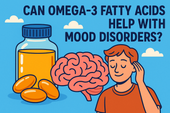
Can Omega-3 Fatty Acids Help with Mood Disorders?
Omega-3 fatty acids do more than support heart health — they can help balance mood, reduce depression, and calm anxiety. Discover how EPA and DHA nourish your brain, fight inflammation, and support emotional well-being from within. 🌊🧠
-

Vitamin D and Mood: The Sunshine Vitamin for Emotional Balance
Could the key to emotional balance be as simple as a little sunlight? Discover how vitamin D — the sunshine vitamin — influences serotonin, reduces inflammation, and helps you feel more positive and resilient year-round. ☀️💛
-

The Role of Magnesium in Reducing Irritability and Low Mood
Feeling on edge or emotionally drained? Magnesium could be the missing link between your body and your mood. Discover how this essential mineral reduces irritability, balances neurotransmitters, and helps your nervous system find calm again. 🌿✨
-
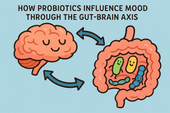
How Probiotics Influence Mood Through the Gut-Brain Axis
Discover how probiotics can do more than support your digestion—they can actually uplift your mood. This article explores the fascinating gut-brain axis and how balancing your gut bacteria through probiotics may help reduce anxiety, improve emotional stability, and support long-term mental well-being. 🌿🧠
-
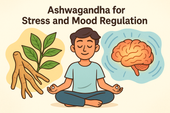
Ashwagandha for Stress and Mood Regulation
Discover how Ashwagandha, the powerful adaptogenic herb 🌿, helps your body manage stress and regulate mood. Learn how it balances cortisol, boosts GABA and serotonin, and supports emotional stability — helping you feel calm, focused, and resilient every day.
-
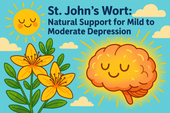
St. John’s Wort: Natural Support for Mild to Moderate Depression
Discover how St. John’s Wort, the “sunshine herb” 🌼, naturally supports mild to moderate depression. Learn how it boosts serotonin, balances mood, and promotes emotional resilience — with research showing its effectiveness compares to antidepressants, but with fewer side effects.
-
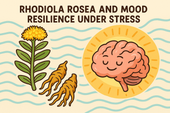
Rhodiola Rosea and Mood Resilience Under Stress
Discover how Rhodiola rosea helps your body adapt to stress 🌿. Learn how this powerful adaptogen balances cortisol, supports serotonin and dopamine, and strengthens emotional resilience — helping you stay calm, focused, and energized under pressure.
-

Chamomile and Lavender: Herbal Calm for Emotional Fluctuations
Discover how chamomile and lavender bring calm to emotional ups and downs 🌿. Learn how these two soothing herbs balance your nervous system, ease anxiety, and support restful sleep — naturally helping you find peace and emotional stability.
-
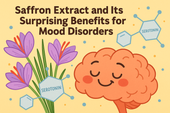
Saffron Extract and Its Surprising Benefits for Mood Disorders
Discover how saffron extract — the golden spice of joy 🌸 — can naturally support mood balance, ease anxiety, and lift mild depression. Learn what science says about its serotonin-boosting power, the ideal dosage, and how this ancient remedy compares to modern antidepressants.
-
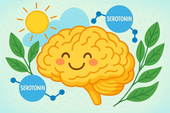
5-HTP and Serotonin: A Natural Path to Lifting Mood
Discover how 5-HTP naturally boosts serotonin 🌞 — the neurotransmitter behind mood, sleep, and emotional balance. Learn how this plant-derived compound supports happiness, reduces anxiety, and improves rest by helping your brain create more serotonin the gentle, natural way.
-
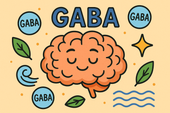
GABA Supplements for Reducing Anxiety and Mood Swings
Discover how GABA supplements can help reduce anxiety and balance mood naturally 🌿. Learn how this calming neurotransmitter works to quiet the mind, ease stress, and improve sleep — plus which nutrients and habits can boost your body’s own GABA production for long-term emotional stability.
-
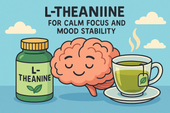
L-Theanine for Calm Focus and Mood Stability
Discover how L-theanine, the calming compound found in green tea 🍵, promotes focus, relaxation, and mood stability. Learn the science behind how it balances neurotransmitters, reduces stress hormones, and enhances clarity — helping you stay centered, calm, and productive without sedation.
-
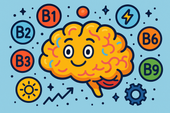
B Vitamins and Brain Chemistry: Supporting Energy and Emotional Balance
Discover how B vitamins power your brain chemistry ⚡. Learn how B6, B9, and B12 support serotonin, dopamine, and energy production — helping boost focus, mood, and emotional balance. From diet to supplements, explore how this vital nutrient group keeps your mind resilient and your energy steady.
-

N-Acetyl Cysteine (NAC) and Mood Disorders: What the Research Says
Learn how N-Acetyl Cysteine (NAC) supports brain health and mood balance 🧠. Discover how this antioxidant helps reduce oxidative stress, regulate glutamate, and improve emotional stability in depression, bipolar disorder, and anxiety — backed by cutting-edge psychiatric research.

















































